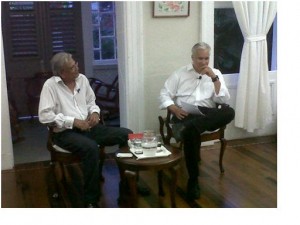By Petamber Persaud
(Continued from last week)

The 2012 Guyana Prize for Literature was awarded in September 2013.
Extract of an interview with Brendan de Caires in Georgetown, Guyana, August 16, 2013.
de Caires is a literary critic and reviewer, working in Canada. He has worked in Trinidad as editor and book reviewer for the “Caribbean Review of Books”, (CRB) and for the review section of “Caribbean Beat”. He has also published other literary articles and reviews, and is a co-founder of Moray House Trust in Georgetown.
De Caries is a native of Guyana who has lived in Britain, Trinidad, Barbados, Mexico, and New York, working as editor, human rights activist, and English literature and ESL teacher. He is currently program and communications coordinator for PEN Canada. This is the second time he has sat on the panel of judges for The Guyana Prize for Literature.
PP How should we go about opening up ourselves to the hidden voices in our society?
BdC That’s a hard question to answer. But here is something – the Guyana I grew up in [early 70s] had the last remnants of a reading public. People were still well educated and there were a number of bookstores. There was still a sense that words mattered.
This is one of the few countries in the world where the national poet can be quoted by more than half of the population. I can only think of one other country where this is likely: Russia. At a certain point in modern Russian history, nearly everyone could quote Anna Akhmatova.
I would say that most people who grew up in the 60s could quote at least three lines of Martin Carter…because he was writing about their reality. Since then I can’t think of any poet of comparable stature. I’m not saying there haven’t been any writers with similar qualities, just none of that stature. Writers who speak to just one section of a society rarely produce anything of substance.
PP As we are on the subject of contemporary writing, what are your thoughts about current Guyanese writers, local writers?
BdC When you are trying to solve the problem of local writing, you can’t fix one thing. You have to revive an education system that will deliver a large number of literate people, you need to have bookstores and publishers with sufficient standing, and quality presses with a credible editorial process. You need people who can vet manuscripts and improve them as needed. There is a tendency to feel that if you publish anything, you’ve arrived – it doesn’t quite work that way. Or at least it shouldn’t. Many countries that have poured a lot of resources into local talent, artistic and literary, regardless of the quality, have often found themselves saddled with a decade of unreadable material.
PP You have just had a close look at Guyanese Literature, what do you think of it?
BdC That’s a tricky question. I don’t want to say anything that is too summary.
I have had two snapshots of what is out there, but I doubt that it is a good indication of what is really available.
PP I understand that. Let’s go on what is available.BdC The first time round, the quality was surprising low and this year, with a few exceptions, it wasn’t much better. Oddly enough the poetry submissions were strong in the first year – even though it’s much harder to write poetry well. But the unevenness in both years comes back to the problems we’ve been talking about. Established writers have a natural advantage in these situations, because their books have been vetted, edited, published. Often they are up against manuscripts which have not been inspected or worked over…
PP Or reworked
BdC But more than that I think you have this distancing effect when you read a novel published by a Guyanese writer who has being living abroad, it is de facto, a novel about the past, probably 30-40 years back. I was struck by the absence of contemporary Guyana in most of the fiction.
PP There is no writing talking back to present day Guyana?
BdC I wouldn’t say there is no writing, but few of these submissions talk back to our current reality. There have to be writers who are dealing with the here and now.
PP We see it daily in the letter columns of the newspapers
BdC There again, the task of addressing daily life and its problems has moved into journalism. It doesn’t belong in fiction any more. (TO BE CONTINUED)
Responses to this author telephone (592) 226-0065 or email: oraltradition2002@yahoo.com
What’s happening:
• The Guyana Annual 2012-2013 magazine is now available at Guyenterprise Ltd, at Austin’s bookstore and from the editor at the above contacts. This issue of the magazine is dedicated to E. R. Braithwaite. The magazine also features articles on copyright, law of intellectual property, creative industries, oral traditions of Guyana, the future of West Indian cricket and the future of books.
• Coming soon: “An Introduction to Guyanese Literature” by Petamber Persaud. This 150-page-book is a rich collection of Guyanese pride and joy, containing more than 100 photographs.



